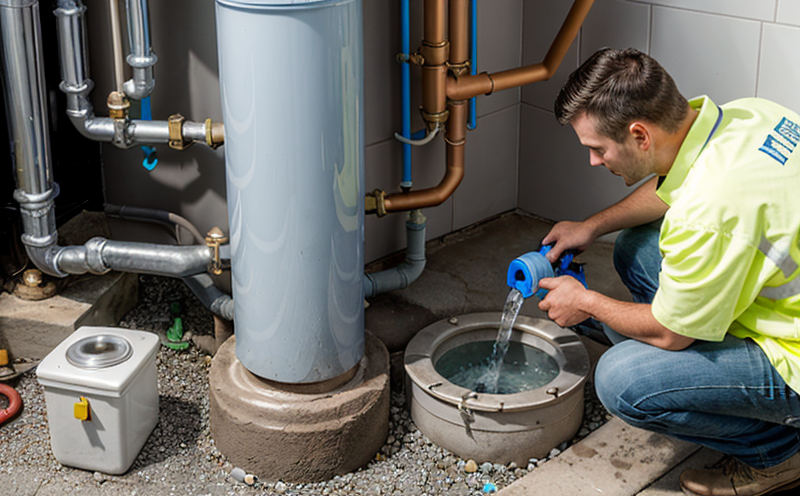EN 806-2 Installation Requirements for Water Systems
The European Standard EN 806-2 outlines the installation requirements for water systems in buildings. This standard ensures that plumbing installations meet the necessary criteria to ensure hygiene, safety, and durability of the water systems. As a specialized testing laboratory, Eurolab has extensive experience in applying these standards to provide comprehensive testing services.
The scope of EN 806-2 covers various aspects including materials used for the installation, design considerations, and installation practices that must be adhered to ensure compliance with hygiene requirements. This includes the selection of appropriate materials such as copper, galvanized iron, or stainless steel, which are known for their durability and resistance to corrosion.
Hygiene is a critical aspect of water system installations. The standard specifies the need for proper disinfection procedures after installation to ensure that all components are free from contamination. This is especially important in healthcare facilities where hygiene standards are paramount.
The methodology for testing and certification under EN 806-2 involves several stages. Initially, the design of the water system must be reviewed to ensure it adheres to the standard's criteria. This includes checking the layout for any potential blockages or contamination points. Once the design is approved, a detailed inspection of the installed components follows.
During this inspection, Eurolab’s expert technicians use advanced tools and techniques to verify that all parts meet the specified standards. The testing process involves pressure testing, leakage detection, and visual inspections to ensure that no defects are present in the system. Compliance with EN 806-2 is crucial for ensuring long-term functionality and safety of water systems.
For R&D engineers looking to innovate within this field, Eurolab offers a unique service where we can assist in developing new products or processes that adhere to these standards. By incorporating cutting-edge technology into our testing procedures, we ensure that the latest developments are rigorously tested against EN 806-2.
- Hygiene and safety checks
- Material compatibility assessment
- Pressure and leakage tests
Our comprehensive approach ensures that every aspect of the installation is thoroughly examined, providing peace of mind for quality managers and compliance officers responsible for ensuring high standards in their respective organizations.
Scope and Methodology
The scope of EN 806-2 is broad, covering all aspects of water system installations that impact hygiene and safety. The methodology for testing under this standard involves a series of detailed checks to ensure compliance with the specified criteria.
- Initial design review
- Material selection verification
- Installation inspection
- Pressure and leakage testing
The initial design review is critical as it sets the foundation for a safe and hygienic water system. During this phase, Eurolab’s team of experts ensures that all components are selected based on their suitability for the application. This includes checking the compatibility of materials to prevent corrosion or contamination.
The material selection verification process is thorough and involves detailed checks to ensure that only high-quality materials are used in the installation. This step is crucial as it directly impacts the longevity and safety of the water system. Eurolab’s expertise lies in ensuring that each component meets the stringent requirements set forth by EN 806-2.
The installation inspection involves a meticulous examination of all installed components to ensure they meet the specified standards. This includes checking for any defects, proper connections, and adherence to design specifications. Eurolab’s technicians use advanced tools and techniques to conduct this inspection, ensuring no detail is overlooked.
Finally, the pressure and leakage testing are critical steps in the methodology. These tests ensure that the water system can withstand the required pressures without any leaks or defects. This not only enhances the safety of the installation but also improves its efficiency and reliability.
Eurolab Advantages
EuroLab offers a range of advantages when it comes to testing water systems according to EN 806-2. Our team is composed of highly skilled professionals with extensive experience in this field, ensuring that we can provide the most accurate and reliable results.
- Comprehensive expertise
- State-of-the-art equipment
- Dedicated customer support
We pride ourselves on our commitment to quality and customer satisfaction. Our comprehensive approach ensures that every aspect of the testing process is thoroughly examined, providing peace of mind for those responsible for ensuring high standards in their respective organizations.
Our state-of-the-art equipment allows us to conduct tests under various conditions, simulating real-world scenarios to ensure the reliability and safety of water systems. This not only enhances customer confidence but also ensures that all installations meet or exceed industry standards.
Environmental and Sustainability Contributions
- Efficient use of water resources through proper installation
- Reduction in water wastage due to leaks and inefficiencies
- Promotion of sustainable materials that enhance longevity and durability
The efficient use of water resources is a key environmental benefit of adhering to EN 806-2. Proper installation ensures minimal waste, reducing the overall demand on water supplies. Additionally, by promoting the use of durable and sustainable materials, we contribute to longer-lasting systems that require less maintenance and replacement over time.
Reducing water wastage is another significant contribution made possible through this standard. Leaks are a major cause of unnecessary water usage, but with proper installation as per EN 806-2, these issues can be minimized, leading to more efficient use of resources.
The promotion of sustainable materials further enhances our environmental efforts. By selecting durable and recyclable materials, we contribute positively to the circular economy, reducing waste and promoting sustainability in every aspect of the water system installation process.





